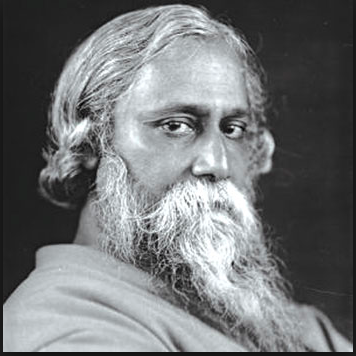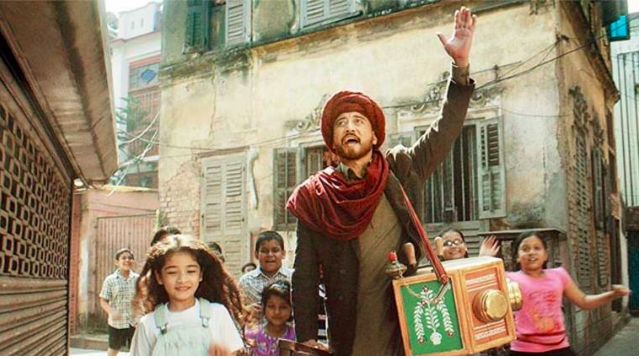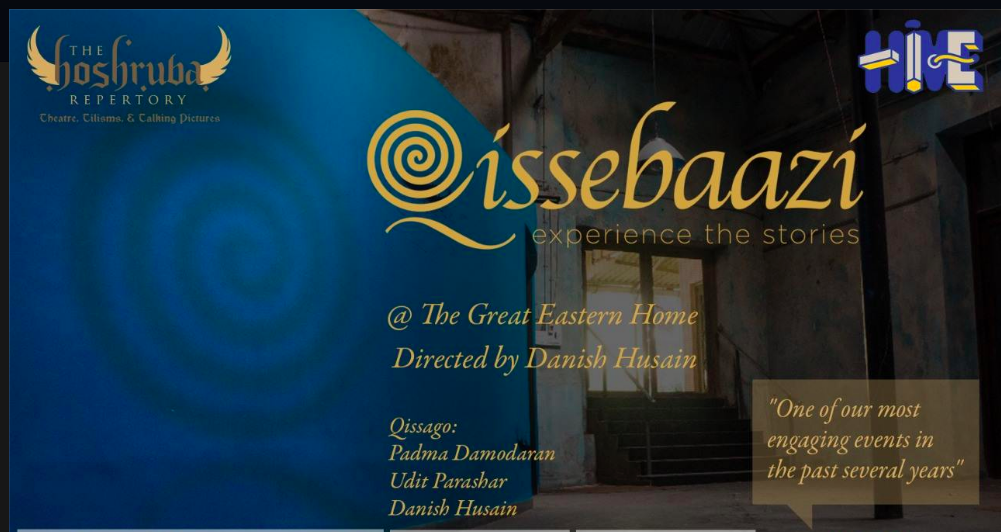|
This blog reviews two events that draws inspiration from Rabindranath Tagore's work: a new bollywood film, Bioscopewala, and two hour long NCPA's Tagore dance and music event. A few days ago, I had a chance to watch a Bengali cultural programme at NCPA, Mumbai. Apparently it was NCPA's first time to organise such an event marking celebration of Rabindranath Tagore's 157th birthday. Dance and music of Tagore refreshed childhood memories of what was to be a Bengali girl.... in Mumbai! "You are a Bengali only when you can recite a Tagore's poem, sing, and dance to the tune of Rabindra Sangeet", Biren dadu warned us. Summer holidays for my friends and me ( in the age group of five to twelve years old) used to be typically spent learning how to read and write the Bengali script in the afternoon, and in the evening dance rehearsals with live music - harmonium, tabla, dholak, mangira while kakus and kakimas had no shy to practice Rabindro sangeet that would echo in our neighbourhood. Every year, we'd to perform for Tagore's Birth Anniversary celebration in Kurla Camp, Ulhasnagar, in the outskirts of Mumbai! Years later I came to realise that Kurla Camp in those days (1980s) was like a probashi Bengali ghetto in the midst of Sindhi colony. The Kali bari (goddess Kali's temple) was literally the center of the earth for the Bengalis in Kurla Camp - everything evolved around it - from the fish market, to bengali sweet shops and library. My friends had assured me that being Ghoti means that I came from the right side of the planet! As a child, I began noticing the difference between Ghotis and Bangals it existed subtly in language accent, food habits.. (or click here https://www.thequint.com/campaigns/bol/ghotis-and-bangals-decoding-a-very-bengali-rivalry). This divide was invisible when it came to prepare for Robi Thakur's on 25th Boishakh celebration, which was in the month of May - everyone would pitch in to prepare the script/ballet, selection of songs, improvisation of our dance movements etc. Aj dhaner kheter, Eso shyamal sundoro, or momo chitte neete nitte ke je nache ta ta thoi thoi .. Best part was that the shy girls, like me, would be completely transformed as a confident perfomer on the stage; little did I knew it was a killer way to teach us team work in an early age. In 2010, my mother at the age of 67 years announced she wanted to learn harmonium and Rabindra Sangeet! She wanted to fulfil her bucket list. For the next five years she mastered the art of singing numerous Tagore's song and playing harmonium. Till my mother's death in May 2015, she continued to learn this art from her much younger teacher friend, Deboshri kakima. I'd almost lost touch of this tradition and it was refreshing to attend NCPA's two hour event on Tagore's dance in may ways. At Experimental Theatre, NCPA, the evening event was for two hours with three performances. The first one was similar to what I'd performed as a child, titled 'Robir Rongey - Tagore through colours and mood'. The second performance was about Ragas and Keertans from Tagore's songs introducing Baul geet and a nice twist of Manipuri and Bharatnatyam fusion. The final performance was from Srijon institute that put me off (and to top it, they used recorded songs; no live music). I left immediately after 10 mins of this last performance. I must admit that the event didn't meet any expectation and I came out disappointed - except the live music of the initial presentations were remarkable. The NCPA needs to review the troupe's performance before engaging in curating an event to avoid unforgettable experience in a negative way! I enjoyed relatively nice show by Shahana and Pubali and Angik. BIOSCOPEWALA
Bollywood films are not for me. In 2017 the only film I watched (and actually paid for ticket at the theatre) was Newton. It's mid 2018 and Bioscopewala is the first and the only Bollywood film I watched. If I've to describe this film in one word, then that word would be 'choppy'. Yet, I loved it and I'm able to relate and empathise with the Director who have kept the dialogues to minimal and let the camera do the action. I wonder why we need so much of dialogues - words eating words. That's probably what I think my film editor at Landing Together films likes to do as well - use less words :-) Overall, Bioscopewala film has nicely used Tagore's lovely story Kabuliwala. I wish Danny Dengzonpa and Kala had got a little bit more space to show their talent - such a beautiful casting. I haven't seen any films of Adil Hussain, but even his acting got lost in the film that didn't capture the father-daughter relationship. Yet, the Deb Medhekar, the director, has nicely managed to pull the story. The rest of the actors didn't impress me enough. I think the film is refreshing, sweet and small, and you come out of the theatre feeling good - especially if you are a Bong like me (or know Bengali language) its a nice treat.
0 Comments
There is no greater agony than bearing an untold story inside you ~ said Maya Angelou. The art of storytelling is what kept human civilisation's love for culture intact. Stories are like a river it keeps flowing even if it has a barrier it flows by changing the route, but never stops. As someone once told me, ...[If] you want to understand a culture then listen to their stories. The month of May I'm rarely around in Mumbai, but this year am ready to experience the heat and humidity. Mango allergy (thanks to calcium cyanide chemical used for ripening this commercial fruit) kicked me nicely already this summer. Mangoes and summer month refreshed my childhood memories. During the afternoons - before the days of air conditions and mobile phones - the summer school holidays for us was hanging under the mango, lemon and jackfruit trees with punjabi, marathi, sindhi and bengali friends playing 'story-story' and practicing 'abriti' (a Bengali word for reciting poems). Few days ago, I received a notification about upcoming event Qissebaazi, and I couldn't resist to click @BookMyShow. About 65km distance i.e. two hours by central local train - that's only one-way journey to listen to a story-telling all the way to Mumbai's Byculla area is something people in my neighbourhood would find hilarious. This is just to explain you the culture of thy neighbourhood matters... Interestingly, The Hive @the Great Eastern Home is nicely tucked 5 minutes around the corner of famous Byculla Zoo. The only lovely memories of the zoo are of the two Baobabs, rest of the zoo's fauna hope finds freedom from chains :-) My first time to the Hive (haven't been to their Bandra location, yet) and am totally impressed with the decor and ambience. The seats @the Hive for the performance was all full by the time I arrived and was lucky to find one seat on the front row - an advantage of travelling single ;-) What to expect when you know nothing about the actors, directors or the stories - I dislike the idea of googling reviews before the plays. The smooth drum beats and soft green lights on the 'stage' background helped audience to calm down - and I was ready to listen. The first story was by the Danish Husain, the director himself. The interesting part of this storytelling was using multi-lingual - Urdu, Malayalam and Hindustani/ Hindi. I was told that the trick of listening to storytelling is to maintain the eye contact with the protagonist, which I realised immediately. The audience of about fifty people kept uttering Wah Wah .. just was an indicator how actors managed to engage the audience. An approach of Dastangoi - the art of storytelling - is about engaging the audience rather than keeping them as mere spectators, which dastango Danish Husain nicely executed in the first 30 mins. The storytelling itself was one tiny bit from dastan e-Amir Hamza's stories. The voice, body language and eye movements and captivating punchlines were completing the words of the story. Just as much exciting it is to know there are thousands of stories to be told from Amir Hamza's work I hope to return to watch Husain's work again. I'm impressed. The next half an hour was another story telling by Padma Damodaran. Damodaran began her performance - a dance and singing in Malayalam. She stops and engages with the audience to translate the meaning of title - a tale of rabbit - and asks audience to repeat the words in Malayalam (Muyol = rabbit).. and she jokes away smartly hinting to the long debate of North and South India's language culture. What amused me is she was using her entire body, unlike a static storyteller - she was dancing and acting while telling a beautiful story. Though it may appear as a children's story, but you know its so much of those untold stories within the story you are listening leaving it entirely on the audience to interpret - gun control, animal cruelty, love, parent-child relationship.. damn, I am just imagining! The final half an hour was equally enthralling by Udit Parashar. I am not going to tell his story but let me tell you that never before this show I thought that there can be a story all about 'spitting'. Udit's voice modulation, expression and his style of using minimum movement, yet strategic one kept audience capsized (at least me!). His storytelling ended without any ends, and though the audience gave a loud sound of clapping the murmurs was like, "I want to know how it (the story) ends.... can't we continue!" Overall, Qissebaazi acts like a teaser to pull you towards the addiction of listening to stories - and it works! Knowing that after the show I will reach home around mid-night, I'd packed some fresh baked goodies including ginger nankhatai from the famous American Express Bakery (Byculla West).
It was a good idea to munch while travelling back in the Karjat fast local train.. although I knew that the hunger to hear more stories just got worsen after this amazing Qissebaazi performance. More stories to be continued.... P.S. The crowd was South Mumbaikaris, but the ticket cost at INR 300 was a plus for many to enjoy the show. I haven't seen the above youtube link of Qissebaazi performance, but you might want to check it. There is nothing like a live show. |
Privacy Policy: We use Google Analytics to collect data to improve the Website. By using and accessing the website you are consenting to use of Google Analytics. All Rights Reserved.
ARchIvES
March 2019
CATEGORIES
All
Privacy Policy: This website uses Google Analytics to improve the Website. By using and accessing the website you are consenting to use of Google Analytics.
|



 RSS Feed
RSS Feed
